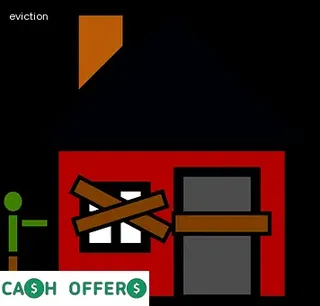Eviction is a process that all landlords and property managers in Wisconsin must understand in order to protect their rights. Wisconsin eviction rules, forms, and procedures are outlined in detail in the state’s landlord-tenant laws.
This guide provides a comprehensive overview of the eviction process for landlords and property managers operating within the state. It outlines the legal requirements for evicting a tenant, as well as providing information on filing an eviction notice, preparing paperwork, appearing in court, and more.
Additionally, this guide offers insight into understanding the legal protections afforded to tenants and how they can be used to better serve both parties involved in an eviction dispute. With a thorough understanding of Wisconsin’s landlord-tenant laws, landlords and property managers will be able to confidently navigate the eviction process while protecting their own legal rights.

Eviction laws in Wisconsin have been set in place to ensure the protection of both tenants and landlords. Wisconsin landlords must abide by state and local regulations when evicting a tenant for failure to pay rent or for violating the lease agreement, as well as other reasons.
The regulations are designed to provide tenants with fair notice and an opportunity to contest the eviction or make arrangements to resolve any issues that led to it. Landlords must also adhere to strict rules as it relates to handling security deposits, providing notice before entering a unit, and other related matters.
Eviction regulations in Wisconsin serve as an important tool in protecting the rights of tenants while also allowing landlords the ability to collect rent or remove problem tenants if necessary.
In Wisconsin, landlords and property managers must have legitimate grounds for an eviction. These grounds may include nonpayment of rent, a violation of the terms in the lease agreement, illegal activity on the premises or failure to vacate after the lease has expired.
Each case should be evaluated on its own merits as laws vary from municipality to municipality. Tenants may also be evicted if they fail to comply with local health and safety regulations or cause damage to the property.
Other legal grounds for eviction include creating a nuisance, engaging in criminal activity that affects other tenants and subleasing without permission from the landlord. In some cases, it may also be possible to evict a tenant if they are found to be harassing or intimidating other occupants of the building.
It is important for landlords and property managers to understand these laws so they can act appropriately when seeking an eviction in Wisconsin.

The process of removing a tenant from a property in Wisconsin begins with a landlord serving the tenant with written notice of eviction. This notice must include a statement of the reason for eviction, such as failure to pay rent or violation of lease terms.
After service, the landlord can proceed with filing an eviction lawsuit in court. The court will set a hearing date where both parties will have the opportunity to present their case and evidence.
If the judge rules in favor of the landlord, they will be issued a writ of restitution, which orders law enforcement to remove the tenant from the property and return it to its rightful owner. Property managers should take all necessary steps to ensure that tenants are provided ample time and warning before being removed from their rental unit.
It is important to understand that every step of this process must comply with state and local laws in order for it to be valid.
Terminations of Tenancy with Cause and Without Cause are two key components in the Wisconsin Eviction Process. Tenancies can be terminated for various reasons, including failure to pay rent or violating a lease agreement.
When a tenant is terminated with cause, it means that the landlord has grounds for eviction due to noncompliance such as not paying rent or violating the lease. On the other hand, when a tenant is terminated without cause, it means the landlord does not have grounds for eviction but instead wishes to end tenancy without giving any explanation.
In either case, landlords must follow state laws and procedures when terminating a tenancy. In Wisconsin, landlords must provide tenants with written notice of termination if they are being evicted with cause and also deliver an unconditional quit notice if they are being evicted without cause.
Additionally, landlords must go through legal proceedings to obtain an eviction order from the courts if the tenant refuses to leave voluntarily after receiving notice. It is important for landlords and property owners in Wisconsin to understand their rights and responsibilities under the law when it comes to evicting tenants in order to ensure compliance and avoid potential legal issues.

In Wisconsin, tenants have certain legal defenses to eviction that they can use to protect their rights. In most cases, the tenant must prove that they have not violated the terms of their lease agreement or acted illegally in order for these defenses to be applicable.
The most common defense is a lack of proper notice by the landlord before filing an eviction lawsuit. If a landlord does not provide written notice at least 12 days before filing for eviction, then the defense may be used.
Additionally, tenants may defend against an eviction if the property owner has failed to make repairs per state or local law or if the tenant was discriminated against on the basis of race, color, national origin, religion, sex, disability or familial status. Other viable defenses include retaliatory evictions and breach of contract by the landlord.
Tenants who can prove any of these circumstances through evidence such as witness testimony and documents may be able to avoid an eviction from their property.
In Wisconsin, eviction proceedings are handled in accordance with the state’s laws and regulations. Landlords and property managers must be aware of all legal requirements when evicting a tenant, as failure to do so can result in serious consequences.
In the event of an illegal eviction, the landlord or property manager may face hefty fines or even potential jail time, depending on the circumstances. Additionally, if a landlord or property manager is found to have wrongfully evicted a tenant, they may face a lawsuit for damages caused by their actions.
Finally, landlords should be aware that it is illegal to lock out a tenant without proper court proceedings and that any attempt to do so could lead to civil penalties. It is essential that landlords and property managers understand all applicable eviction laws and procedures in the state of Wisconsin before beginning the eviction process.

The Wisconsin eviction process has a timeline of events that must be followed if an eviction is to be successful. The first step is usually the landlord giving notice to the tenant, either in writing or orally, that they are in breach of their lease agreement and need to remedy the situation.
This can also include providing them with a legal document known as a Notice to Quit, which sets out the terms of their termination and how much time they have to vacate the property. After the notice period has elapsed, if the tenant still refuses to leave then the landlord can go ahead and file for an eviction in the county courthouse.
The court will then issue a Summons and Complaint, which needs to be served on the tenant by a sheriff or other authorized individual. Following this, there will typically be a hearing where both parties can present their arguments and evidence before a judge who will ultimately make a ruling on whether or not an eviction should take place.
After receiving this decision from the court, assuming it is in favor of the landlord, then they may proceed with having locks changed or hiring movers to remove any tenant belongings that remain after they have vacated.
When it comes to evicting tenants, each state has different laws and procedures that landlords and property managers must abide by. In Wisconsin, eviction is a legal process that must be followed in order for the landlord or property manager to regain possession of the rental unit.
This comprehensive guide will provide an overview of the Wisconsin eviction process so that landlords and property managers can compare it with other states' laws. Wisconsin's eviction process is defined in Chapter 799 of the Wisconsin Statutes; this chapter provides detailed information about the tenant’s rights and landlord’s obligations during an eviction proceeding as well as any associated fees.
It also outlines how much notice a landlord must give a tenant before an eviction hearing, how hearings are conducted, and how judgments are made. Additionally, Chapter 799 addresses topics such as lockouts and evictions related to domestic violence cases.
While there are many similarities between states when it comes to the eviction process, such as requiring notice periods or providing access to legal counsel, there are also important differences that landlords and property managers need to be aware of before taking action against a tenant. Understanding these differences is essential for successfully navigating the Wisconsin eviction process.

In Wisconsin, landlords and property managers must provide a written notice to the tenant before filing an eviction. This notice period is required by law, and failure to provide proper notification can result in a dismissal of the eviction case.
The length of the required notice period depends on the type of tenancy and violation that led to the eviction. For most tenants, the notice period is seven days for nonpayment of rent or breach of lease terms; however, if there is a violation involving illegal activities or endangerment, the notice period is only three days.
Additionally, tenants who have been residing in the same rental unit for more than six months must be provided with a 30-day notice before an eviction can be filed. It’s important to note that any notices provided must include appropriate language indicating that if certain requirements are not met within the stated time frame, then an eviction will be sought.
Furthermore, it must be sent through certified mail so that proof of delivery is available. Following these guidelines will help ensure that all legal requirements are met when evicting tenants in Wisconsin.
In Wisconsin, landlords and property managers must be aware of the state's qualifying factors for criminal activity-related evictions. According to state law, a landlord may terminate a tenant's lease agreement if the tenant is found guilty or charged with certain criminal activities that are listed in Wisconsin Statute 704.
44. These activities include arson, prostitution, drug possession and distribution, and other violent crimes against persons or property.
In addition to the criminal activity, the landlord is required to prove that such activity has occurred on or near the rental property in order to initiate an eviction process. Moreover, tenants who are involved in any illegal activities that threaten the safety of other tenants or neighbors can also be evicted from their rental units.
It is important to note that landlords cannot evict tenants based solely on suspicion or rumors of criminal activity; they must have evidence of such activities before initiating an eviction process.

In Wisconsin, landlords cannot file an eviction suit against a tenant under certain circumstances. These include the tenant's refusal to pay rent due to the landlord's failure to maintain the rental property in accordance with state housing codes or a breach of the lease agreement by the landlord.
Additionally, landlords cannot evict tenants who are protected by discrimination laws such as those concerning age, gender, race, and disability. In cases of retaliatory eviction, where a tenant has exercised their rights such as making complaints about code violations or joining a tenant’s union, landlords are also prohibited from filing an eviction suit.
Furthermore, if a tenant is on active military duty and has not breached the terms of their lease agreement, they may not be evicted. Finally, landlords may not evict tenants for non-payment during winter months between November 1 and April 15 in Wisconsin without approval from the court.
The time it takes to complete an eviction in Wisconsin can vary depending on the particular situation. Generally, it takes at least two weeks before a tenant is required to vacate the property.
This includes the three-day notice period, during which the tenant can either pay the overdue rent or move out. If they do not take action within that time frame, then landlords can proceed with filing an eviction lawsuit with their local court.
The length of time it takes to receive a judgment from the court may be anywhere from one to four weeks. After that, if the tenant doesn't move out, then there will be a waiting period for a hearing date and sheriff's assistance for removal.
This entire process can range from two to six weeks, depending on various factors such as whether legal counsel is needed or if any extensions are granted throughout the process. Property managers should also take into account additional time for post-eviction tasks like cleaning services or repairs and maintenance.

Wisconsin evictions follow a complex and strictly enforced set of laws.
Landlords, property managers, tenants, and legal professionals all need to know the laws when it comes to evictions in Wisconsin.
This comprehensive guide will answer common questions about the Wisconsin eviction process such as what is an eviction notice, what is a landlord’s responsibility during an eviction, are there any tenant rights during an eviction in Wisconsin, what are the steps in the eviction process, what happens if a tenant doesn't leave after being evicted, and more.
It’s important for landlords and property managers to understand the ins and outs of evicting a tenant in Wisconsin so they can make sure they are following all of the necessary steps while also protecting their own rights.
When dealing with an eviction in Wisconsin, it is important for landlords and property managers to be aware of the state's laws and procedures. Eviction in Wisconsin is governed by Chapter 799 of the Wisconsin Statutes and is a serious matter that must be taken seriously.
Landlords are expected to follow all of the steps required under the law, including providing proper notice to tenants, filing an eviction action in court, obtaining a court order directing the tenant to vacate the property, and executing the writ of restitution. Additionally, landlords should also understand their rights when it comes to evicting a tenant, such as being able to collect unpaid rent or damages from tenants who refuse to leave voluntarily.
It is important for landlords and property managers to familiarize themselves with all of these key points so they can ensure that their eviction process follows all applicable laws and procedures.

Finding legal advice from landlord-tenant attorneys is an important part of navigating the Wisconsin eviction process. Landlords and property managers should understand their rights and responsibilities under Wisconsin law, including working with attorneys to ensure compliance with eviction laws.
Legal counsel can help landlords and property managers understand their responsibilities during the pre-eviction process, such as providing proper notices to tenants, filing a summons and complaint with the court, and executing a writ of restitution. Attorneys can also provide guidance on tenant defenses in court proceedings, filing motions for summary judgment or default judgement, as well as defending against counterclaims brought by tenants.
In addition, legal advice can be invaluable when it comes to understanding the rules governing post-judgment activities like issuing writs of garnishment or appeals. Ultimately, seeking advice from landlord-tenant attorneys is an essential step to ensuring that all parties involved in the eviction process are fully informed of their rights and responsibilities under Wisconsin law.
Though the COVID-19 pandemic has presented unprecedented challenges to landlords, property managers, and tenants in Wisconsin, eviction law has remained largely unchanged. Tenants can still be legally removed under certain circumstances.
However, during this time of national emergency, landlords and property managers must take extra precautions when filing an eviction notice. According to the Wisconsin Department of Health Services, all evictions should be handled with due consideration for public health and safety guidelines.
This includes making sure that tenants have access to necessary services such as food banks and healthcare resources before issuing an eviction notice. Additionally, landlords may not use self-help evictions or lockouts without a court order from a judge.
If a tenant cannot pay rent due to financial hardship caused by the pandemic, landlords must work with them to come up with alternative payment arrangements or postpone rent payments until after the crisis is over. Overall, it is critical for everyone involved in the Wisconsin eviction process to familiarize themselves with relevant laws and procedures so that evictions can still be carried out in a fair and safe manner during the COVID-19 pandemic.

The average duration of an eviction in Wisconsin varies depending on the circumstances of the case. Generally, the process takes between 30 and 60 days, although it can take longer if a tenant contests the eviction.
Landlords must first issue a notice to vacate in accordance with state law, then file a complaint with the court. The tenant will be served with a summons and complaint and given five days to respond.
If they do not respond, or if their response is insufficient, the landlord may request a default judgment from the court. The court will then conduct hearings to determine whether grounds for eviction exist and whether damages should be awarded to either party.
Finally, if an eviction order is granted, the sheriff or other enforcement officer can execute it, which usually requires another two weeks. During all of these proceedings, landlords should consult experienced legal counsel to ensure that they are following all of Wisconsin's laws and procedures regarding evictions.
Wisconsin landlords and property managers must follow certain laws and procedures when evicting a tenant. The eviction process can be complex and difficult to navigate, so it is important to understand the rules in order to ensure that evictions are handled appropriately.
This comprehensive guide provides tips for navigating the Wisconsin eviction system, including an overview of the legal requirements and steps that must be taken before a tenant can legally be evicted. Landlords and property managers should become familiar with the state's landlord-tenant laws, review relevant documents such as leases and notices, consider filing for small claims court if necessary, serve notice as required by law, follow all deadlines set forth by the court or local government, and obtain any necessary assistance from local legal aid organizations.
Understanding these steps can help landlords ensure that their eviction process is conducted in accordance with state law.
In Wisconsin, the eviction process can move quickly if the landlord follows all of the required laws and procedures. Typically, a tenant has between 3 to 5 days to respond to an eviction notice.
If the tenant does not comply with the notice, then the landlord may file a summons and complaint with the court. After filing with the court, a hearing will be held and a judge will decide whether or not to grant an eviction order.
The entire process typically takes around 2 weeks if no appeals are filed. However, if an appeal is filed, then it could take several months before an eviction order is granted by the court.
It is important for landlords and property managers in Wisconsin to understand all of their legal rights regarding tenants, as well as all of the laws and regulations surrounding evictions in order to ensure that all parties are protected during this process.

In Wisconsin, the eviction timeline for tenants is relatively short. A landlord must give the tenant notice of eviction prior to filing a complaint with the court.
Once the court orders an eviction, the tenant has seven days to move out unless otherwise noted in the judgment. If a tenant fails to vacate the property within seven days, a landlord can file a motion for writ of assistance with the clerk of court and request assistance from local law enforcement in removing the tenant from the property.
Landlords should take note that during this time, they are still obligated to provide basic services (heat, water, etc.) and may be liable for damages if these services are not provided.
It is important for landlords and property managers to understand their rights and obligations when it comes to evicting tenants in Wisconsin so that they can ensure their legal rights are protected while also providing tenants with fair treatment throughout this process.
In Wisconsin, the eviction process has strict laws and procedures that landlords and property managers must follow. According to state law, landlords must first provide written notice to tenants informing them of their intention to terminate the tenancy.
The amount of time for which this notice must be given depends on why the landlord is seeking eviction—for example, if it’s for unpaid rent, landlords must give tenants 14 days’ notice. If a tenant doesn’t comply with the terms of the written notice within the specified time period, then a landlord can file an eviction action in court.
After filing an action in court, a landlord must also serve a summons and complaint upon their tenant. Finally, when all legal documents are served, a hearing will be scheduled at which both parties can present evidence as to why or why not an eviction should occur.
It is important for both landlords and tenants to understand their rights throughout each step of this process in order to ensure that Wisconsin’s strict laws are followed correctly.
Evictions in Wisconsin are governed by the Wisconsin Landlord-Tenant Law, which sets out specific rules and procedures that landlords and property managers must follow. It is possible to delay an eviction in Wisconsin, but only if certain conditions are met.
For example, if a tenant has paid all or part of the rent due for the month and/or has entered into a payment agreement with the landlord that upholds their lease obligations and conditions, then a landlord may not be able to proceed with an eviction. Additionally, tenants can also delay an eviction if they have made arrangements with their local housing authority for emergency rental assistance.
In these cases, the landlord must wait until such funds are received before taking further action against the tenant. In some cases, even after funds are received from a housing authority, the tenant may still have up to 21 days to pay past due rent or vacate according to Wisconsin law.
Knowing how to properly delay an eviction in Wisconsin is essential for both landlords and property managers who wish to remain compliant with local laws and regulations.
A: The length of an eviction process in Wisconsin varies depending on the specific circumstances of each case. Generally speaking, it can take anywhere from a few weeks to several months. This timeline is largely determined by the Property Manager's Responsibilities, Landlord Rights and Obligations, and Rent Payment Procedures as outlined in Wisconsin Eviction Laws.
A: The length of an eviction process in Wisconsin can vary depending on factors such as the complexity of the case, legal representation for either party, and how quickly all parties involved respond to court orders. Generally speaking, a typical eviction process can take anywhere from two to six weeks.